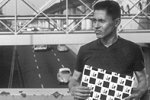 SHADOWS ARTHOUSE FILMS ’04
SHADOWS ARTHOUSE FILMS ’04On this page — films from the British Film Institute's 18th London Lesbian & Gay Film Festival, Mar-Apr.04
GONE BUT NOT FORGOTTEN | JUCHITAN QUEER PARADISE
KOMRADES | THE ROAD TO LOVE | A THOUSAND CLOUDS OF PEACE...
< < M O R E | M O R E > >
More mainstream art films have their own pages.
Other offbeat films are at: SHADOWS FILM FESTIVAL | FESTIVAL SHORTS
last update
19.Mar.04
 GONE, BUT NOT FORGOTTEN
GONE, BUT NOT FORGOTTEN


|
dir-scr Michael D Akers with Aaron Orr, Matthew Montgomery, Joel Bryant, Brenda Lasker, Ariadne Shaffer, Bryna Weiss, Sandon Berg release UK 28.Mar.04 llgff • 03/US 1h34  REVIEW BY RICH CLINE |
Yes, the whole amnesia plot is very corny, but writer-director Akers is actually examining serious issues of sexuality and denial, and even though the film has a fairly breezy, rom-com feel to it, there's a sincere undercurrent that grapples with much more thoughtful ideas. But it's way down there! On the surface, it all seems pretty absurd, mostly because the film is made on such an unspeakably low budget (and it shows). The acting is a bit stiff, the sets are rather flaky and the editing is pretty rough. There are also random sequences that feel like irrelevant padding, such as a hospital corridor wheelchair race, a lame dress-up montage and a soft-porn scene that's somewhat sexy but doesn't actually feature any sex. On the other hand, the dialog is bracingly natural, Shaun Cromwell's guitar-based score is lovely, and there are some very strong scenes in which the actors get to really flesh out their characters (no pun intended). It's these moments, as well as the captivating story, that keep us glued. And win us over. [themes, language, sex] 25.Feb.04 llgff
 KOMRADES
KOMRADES


|
dir Steve Kokker with cadets at a military academy in St Petersburg, Russia release UK Apr.04 llgff • 03/Canada 1h04  REVIEW BY RICH CLINE |
Of course, a lot of the closeness--and the antics--are the result of heavy drinking, which is as fundamental to Russian society as mandatory military service! You can see how the barriers fall even further after a bit of the vodka, and these charming men are happy to talk about their most intimate friendships and tell stories of hilarious excesses. They also talk about such issues as hazing (apparently some 3,000 die annually in initiation incidents) and the homosexual tensions that gurgle continually but are never, ever spoken of. Technically, the film is quite rough (the movie clips look like copies of copies of bootleg videos!), and it feels padded out by lots of patriotic songs. But even though Kokker's own footage is of home video quality, its impact is still strong. There's an easy physicality to these friendly, muscled guys, some of whom conduct interviews drunk ... or naked. And the film becomes much more important as it digs into the definition of a "real man" as being honest, loving and willful.Then we begin to see how the knowledge of this truth combined with repressed sexuality and institutionalized violence affects the society at large. This makes the film much more than just a look into a Russian subculture. [themes, language] 19.Mar.04 llgff
 THE ROAD TO LOVE [Tarik el Hob]
THE ROAD TO LOVE [Tarik el Hob]


|
dir Remi Lange • scr Remi Lange , Antoine Parlebas with Karim Tarek, Riyad Echahi, Sihem Benamoune, Abdallah Taia, Mustapha Khadar, Farid Tali, Mehdi Jouhar, Roschdy El Glaoui, Mohamed Garca, Madjid, Djamel Lempereur, Ali Negrem release UK 28.Mar.04 llgff • 03/France 1h10  REVIEW BY RICH CLINE |
Karim (Tarek) is a student in Paris who decides to do a sociology project on homosexuality in North Africa, starting with the fact that gay marriages were allowed--and encouraged by Islamic religious leaders--in some countries up until the 1940s. Karim's girlfriend (Benamoune) is a bit nervous about this, and while interviewing people with experience in the matter, Karim meets all sorts of interesting guys, most of whom flirt shamelessly with him. He freaks out at most of this, especially when the sparky Farid (Echahi) challenges him to discover the gay man within himself. Karim is horrified at the thought, but can't bring himself to stay away.
Besides the intriguing glimpse of North African history and culture, the film effortlessly captures the personalities and lifestyles of French young people of North African extraction. Director Lange seems happy to just let the camera linger on his subjects, catching whatever they might say or do. This gives the film a raw honesty and openness that draws us into the story, even though it's almost infuriatingly tentative and muted. Performances are just as natural--Tarek and Echahi create characters we really like--charming and infuriatingly opinionated. Their good-natured teasing is great fun to watch. And as the film gets more and more serious, and travels from Paris to Marseilles, Amsterdam, Morocco, Tangiers and even Jean Genet's beachfront grave, it has a universal truthfulness that deals with the cultural issues sensitively and frankly. Meanwhile, the sweet romance is winning us over minute by minute. [themes, language, nudity] 21.Mar.04 llgff
 JUCHITAN QUEER PARADISE
JUCHITAN QUEER PARADISE


|
dir-scr Patricio Henriquez with Oscar Cazorla, Angel Santiago Valdivieso, Eli Bartolo, Hector Matus, Vicente Martin release UK Mar.04 llgff • 02/Mexico 1h05  REVIEW BY RICH CLINE |
Oscar is a businessman who organises the town's biggest annual party, the Vela of the Authentic Intrepid Danger Seekers, an Aids benefit that runs for days. An obvious queen, he has also fathered a teen son and is a prominent pillar of society. Angel, on the other hand, is a muxe, a man who lives as a woman, and we meet him with his parents, see him working in his beauty salon and follow him en route to be the queen of Intrepids' party. And Eli is a teacher with decidedly unconventional views (he believes zoophilia is a legitimate sexuality, for example, and that marriage is more immoral than prostitution). But his lifestyle and opinions are respected in Juchitán, even if no one really agrees with him.
The film's colourful, slightly camp style and travelogue segments mask something much more serious going on here, namely an examination of how Western cultures have imposed artificial man-made roles on the world in the name of religion. Juchitán is a rare culture that's deeply steeped in religious tradition, and yet the women, indigenous groups and sexual minorities are integral and valued. It's simply not like this anywhere else in Latin America! And it's clearly the way we the world should be. No, this isn't paradise--some violent homophobia is still present, and there's only one long-standing gay couple. But we have a lot to learn from a tiny community that celebrates human diversity in such a unique way. [themes, language, brief sex] 9.Mar.04 llgff
 A THOUSAND CLOUDS OF PEACE FENCE THE SKY, LOVE, YOUR BEING LOVE WILL NEVER END
A THOUSAND CLOUDS OF PEACE FENCE THE SKY, LOVE, YOUR BEING LOVE WILL NEVER END[Mil Nubes de Paz Cercan el Cielo, Amor, Jamás Acabarás de Ser Amor]


|
dir-scr Julian Hernandez with Juan Carlos Ortuño, Juan Carlos Torres, Pablo Molina, Miguel Loaiza, Salvador Hernandez, Manuel Grapain Zaquelarez, Mario Oliver, Llane Fragoso, Rosa Maria Gomez, Martha Gomez, Clarisa Rendon, Pilar Ruiz release UK 29.Mar.04 llgff • 03/Mexico 1h20  REVIEW BY RICH CLINE |
Hernandez films this beautifully in black and white, filling the screen with close-ups of expressive faces. He's clearly influenced by Cocteau's iconic and surreal filmmaking style--it's evocative, poetic and more than a little pretentious. This is a film about images and feelings, so there's very little dialog. The story itself is elusive, and yet the film effectively captures the disparity between love and sex on the gay scene (or any other scene for that matter). These are people trying to be happy but continually running into roadblocks--issues of attraction, lame excuses, a fear of commitment. Gerardo's immaturity doesn't help either; he has no idea what he really wants and he's always in need of money (and someone's always ready to give him some, for one reason or another). As an actor, Ortuño captures this very well, although like the rest of the cast he's so muted that we never feel like we get beneath the surface. Flashes back and forward in his story help fill things out, but in the end it's hard to tell whether the film is any good or not. It's certainly lovely to look at. But it's also very dull. [themes, language, nudity, sex] 25.Feb.04
